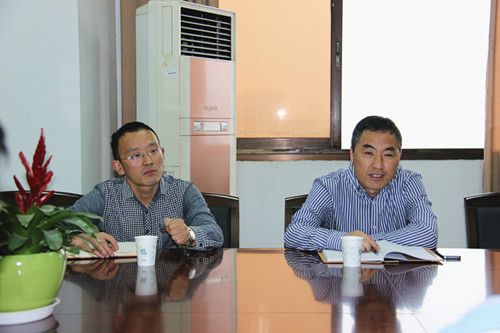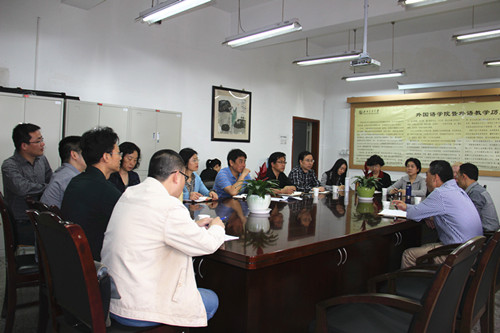Mr. Zhang Xueyong, the newly-appointed Chief of the Division of Liberal Arts, and Lei Bin, the Deputy Chief, visited the School of Foreign Languages (SFL) to gather suggestions and information for the development of the liberal arts. Xu Ge, Secretary General of the CCP Committee at the SFL, Mr. Wang Weimin, Executive Deputy Dean, Tang Yueqin, Wang Pengfei, Deputy Deans, Ren Xinhong, Deputy Secretary General, Yang Anwen, Assistant Dean, members of the professor Committee, heads of all the Divisions, the directors of the research institutes, and teacher representatives, all attended the meeting, which was presided over by the Executive Deputy Dean, Mr. Wang.
Mr. Zhang pointed out that the establishment of a Division for the Liberal Arts was of great significance in the history of SWJTU. Immediately after inaugurating the new Division, they chose the SFL as their first destination for collecting recommendations and visited the SFL on their first working day. They hoped that their discussions with their SFL colleagues would help provide information and support for the role definitions, working arrangements, and overall plans for the newly founded division.

Mr. Wang extended a warm welcome to the two chiefs on behalf of the SFL. He said that the Department of English was the very first amongst all the departments of liberal arts at the University to be established. The SFL has played a key role in the development of SWJTU, as it has offered remarkable support in the rapid development and internationalization of the other disciplines of science and engineering. The discipline of foreign languages belongs naturally to that of the liberal arts, but it also covers a multi-disciplinary area that manages to integrate different aspects such as culture, communication, and language etc. The faculties and students at the SFL can not only carry out research in the fields of humanity and philosophy, but be also capable of translating materials and managing contracts for engineering projects, which play an irreplaceable role in the development and internationalization of a comprehensive university. Under the development guidelines for the liberal arts at SWJTU, more attention should be paid to, and more support will be provided for, the SFL.
Ms. Xu Ge stated that they were impressed that the Division Chiefs chose the SFL as their first port of call, as she said that foreign languages had struggled to survive at SWJTU, which was dominated by the engineering disciplines. She believed that this unfavorable situation for the SFL’s development would be improved by the establishment of a Division for the Liberal Arts. In her opinion, the new Division was well aware that the development of the liberal arts should take a different path based on its own characteristics and needs, and that this must be taken into consideration in the SWJTU’s overall plan.

Participants expressed their views that can be summarized as follows: 1) the establishment of a Liberal Arts Division provides a channel for the art departments to express their opinions; 2) in the context of rejuvenating the liberal art disciplines, the Division should be active in making plans and providing guidance for the development of the liberal arts; 3) the Division should focus on discipline classification, respect the characteristics of foreign languages, and facilitate the self improvement of teachers; 4) research, in the field of foreign languages, is multi-disciplinary and is confronted by problems like insufficient funds or inadequate resources, and is in dire need of attention and support from the University; 5) textbooks and translations should be considered as the equivalent of research results in the engineering and science disciplines when they are being evaluated; 6) the SFL should play a more vital role in the promotion of international Chinese as it is both interdisciplinary and multilingual, and the qualities and qualifications of the faculty at the SFL can best meet the requirements of international Chinese teaching; 7) the University should pay more attention to the sustainability of talents cultivation, and take the needs of young teachers into full account in their career development, and make reasonable and effective plans.
All participants agreed that the SFL should engage in the cultivation and development of talents from different perspectives and on different levels, rather than just offering public English courses or providing training classes and sessions to help increase the pass rates in CET4 and CET6 examinations. The SFL offers: 6 undergraduate programs which include English, Japanese, German, French, international Chinese and engineering English; a postgraduate programme in first-level master’s discipline of Foreign Language and Literature; and 1 doctor’s discipline co-established with the School of Arts and Communication. With the strong support of the university and the united efforts of its teachers, the SFL will have a bright and promising future.
After listening to all the opinions and suggestions, Mr. Zhang and Lei spoke highly of the development and endeavors that the SFL has made, and indicated that they thought that the SFL would be bound to leap forward with its years of accumulated experience. Mr. Zhang suggested that the SFL should concentrate on more explicit and specific goals and build a platform to facilitate their development in an all-round way, and that the Liberal Arts Division would always be glad to help and support the SFL. At the end, Mr. Lei shared some important information with all the participants.
The meeting was deemed a great success, and everyone believed that satisfactory results had been obtained.